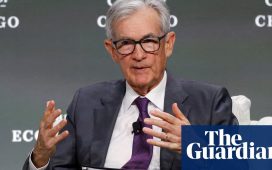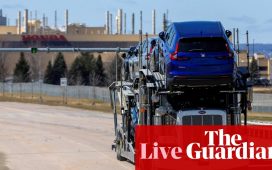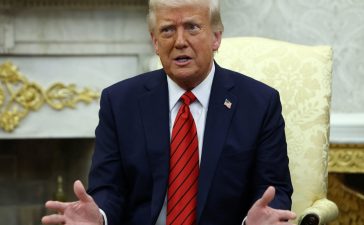UK living standards decline as GDP per head falls
The depressing fact from this morning’s growth report is that UK living standards, as measured by GDP per capita, have fallen for two years running.
As flagged at 7.15am, GDP per head fell in the second half of 2024, and in each quarter in 2023.
That means that the increase in activity was more than outpaced by increased population, indicating that individuals won’t actually feel any benefit from growth in the economy, such as the 0.1% rise in GDP in Q4 2024.
Sam Miley, managing economist and forecasting lead at the Cebr thinktank, says this highlights the “poor conditions” faced by the UK economy:
“The UK economy returned to growth in Q4, surpassing expectations with an expansion of 0.1% on the quarter. Though welcome news, this feeble rate of growth is still evidence of a weak trajectory, which is expected to persist into 2025.
Q4’s figures take full year growth for 2024 to 0.9%, marginally above Cebr’s forecast of 0.8%. However, in a further sign of the poor conditions facing the UK economy, GDP per capita fell by 0.1% over this period. This metric has now fallen for two consecutive years, suggesting declining living standards.”
Simon French, chief conomist at Panmure Liberum, says this is the crucial measure for the government to improve:
This is the chart that requires the turnaround – UK GDP per capita has fallen for six of the last eight quarters, under governments of both shades. There will be little electoral credit for growth until this inflects higher. pic.twitter.com/x3ysG0HDPI
— Simon French (@Frencheconomics) February 13, 2025
It is worth noting that almost all the economic evidence suggests that after a large inward migration surge like the one the UK has experienced since Brexit, GDP per capita will be depressed given a large denominator effect. But the medium term outlook is more rosy given what we… https://t.co/SoArwlT04X
— Simon French (@Frencheconomics) February 13, 2025
And here’s Sandra Horsfield, economist at Investec, on the fall in GDP per head:
In calculating these figures, the ONS took on board new, higher, population estimates that incorporate more net migration into the UK.
Indeed, on a per-capita basis, GDP fell by 0.1% in 2024 after a 0.9% decline in 2023. Whereas this is by no means a perfect gauge of living standards, it illustrates that momentum is still lacking.
Key events
Closing post
Time to recap…
Britain’s economy unexpectedly eked out growth in the final three months of last year.
UK GDP rose by 0.1% in Q4 2024, thanks to a 0.4% rise in activity in December.
The better-than-expected data dampened fears that the UK was on the brink of recession. But, chancellor Rachel Reeves said she was “still not satisfied” over the pace of growth.
The GDP report also showed that the economy shrank on a per capita basis, meaning that living standards have declined in the last two quarters.
Here’s the full story:
The UK’s competition regulator has pledged to “drive growth and investment” and speed up its decisions after pressure from the government to be more pragmatic and less risk averse in its investigations.
The oil price has dropped after Donald Trump declared that he and Vladimir Putin were ready to discuss peace talks to end the Russia-Ukraine war.
Ukraine government bonds strengthened in value.
Trump is also expected to another round of tariffs today from the Oval Office.
The president made the news in a brief message on Truth Social:
NEWS CONFERENCE ON RECIPROCAL TARIFFS TODAY, 1:00 P.M., THE OVAL OFFICE. MAKE AMERICA GREAT AGAIN!!!
UK GDP: the key charts
Here’s a chart showing how UK economic growth picked up in December:
And here’s a breakdown showing the main sectors of the economy:

Jasper Jolly
The US Department of State has removed the name of Tesla from a list of planned purchases, after an earlier version of the list said it would spend $400m buying new electric armoured vehicles, even as the carmaker’s boss, Elon Musk, leads efforts to slash government spending under Donald Trump.
A procurement forecast produced by the department showed the $400m (£320m) proposed spending on “armoured Tesla (production units)” in December. The most likely Tesla model was the Cybertruck, the company’s electric pickup, given Musk’s claims that the vehicle is bulletproof.
However, a spokesperson for the department said the document was incorrect, and should have been a generic entry reading “electric vehicle manufacturer”. The department said the order was on hold.
Nevertheless, the listing raises the possibility of more conflicts of interest for Musk, who is one of the biggest beneficiaries of US government contracts through the companies he controls.
Ukraine’s sovereign dollar bond prices have rallied for second consecutive day, on hopes that peace talks with Russia could lead to a ceasefire.
Reuters has the details:
Several of Ukraine’s bonds gained more than 2 cents before retracing slightly.
The 2036 maturity led the gains, adding 2.05 cents to be bid at 68.30 cents on the dollar…
Ukraine’s bonds have rallied strongly since Trump’s re-election in November last year, and returned over 60% in 2024. That rally has continued this year, with the 2036 maturity gaining more than 9 cents since the beginning of January.
Wall Street has opened a little higher.
The Dow Jones industrial average, which tracks 30 large US companies, has gained 47 points or 0.1% to 44,416 in early trading.
The S&P 500 index has gained 0.25%, while the tech-focused Nasdaq is 0.5% higher.
Investors are weighing up the prospects of peace talks in the Russia-Ukraine war, and also Donald Trump’s post earlier that he will announce reciprical tariffs today….
Moody’s: UK avoids complete stagnation
Credit rating agency Moody’s fears that UK growth this year will be weak, despite the economy posting a modest expansion of 0.1% at the end of 2024.
Andrew Hunter, associate director and senior economist at Moody’s Analytics, says:
The 0.1% quarterly rise in GDP in the fourth quarter was marginally better than we had expected and means the U.K. economy has avoided a complete stagnation over the second half of last year.
That said, the details suggest that underlying momentum remains weak, with household consumption broadly unchanged and fixed investment falling slightly. Growth was saved by positive contributions from government spending and inventory accumulation.
We still forecast growth to pick up again over the coming quarters as stronger government spending continues feeding through and monetary policy is loosened further, but we now forecast growth for 2025 as a whole of only 0.9%, in line with the figure for 2024.”
Oil price weakens on Ukraine peace deal hopes
The oil price has weakened today, after Donald Trump announced that he and Vladimir Putin were ready to begin negotiating an end to the war in Ukraine.
Brent crude, the international benchmark, dropped by 2.3% yesterday and lost another 1% today to as low as $74.06 per barrel, the lowest since the end of December.
US crude also fell to its lowest this year, at $70.22 per barrel.
Analysts at Saxo say:
Crude oil prices dropped all day yesterday, in part on Trump announcing that he will negotiate with Putin to end the war in Ukraine.
Fawad Razaqzada, market analyst at City Index, concurs that Trump’s announcement has moved the markets:
Yesterday, markets responded positively to President Donald Trump’s discussions with Russian President Vladimir Putin, in which both leaders agreed to initiate talks aimed at ending the Ukraine war. While no concrete agreements have been reached, the mere fact that negotiations are beginning has been reflected in European asset pricing.
A potential resolution could significantly ease war-related costs, particularly in the energy sector, while reducing uncertainty and improving business confidence—an outcome that would be especially beneficial for Europe’s largest economies, and by extension the euro.
There are concerns, though, that Washington DC has made concessions to Moscow even before talks start – by ruling out Nato membership for Ukraine, and suggesting Kyiv must forfeit some of its territory.
Here’s our news story about the UK’s competition regulator pledging to “drive growth and investment” by shaking up its approach to regulation.
Today rise in US producer price inflation is bad news, reports Scott Helfstein, Global X’s head of investment strategy.
Helfstein says:
“While producer prices were expected to increase, producer inflation grew faster than expected. That is the bad news. The good news is that companies are still running strong profits across most sectors of the economy, which should prove more important for investors.
Prices for inputs in early-stage intermediate demand grew at the fastest pace since 2023, meaning companies are seeing raw inputs rise across goods and services. The Fed is likely going to pay attention and be cautious to see how that passes through to consumer expectations.”
Over in America, we have further signs that inflation is picking up.
US producers raised their prices by 0.4% per month in January, faster than the 0.3% which Wall Street expected.
Services producers raised their prices by 0.3%, while goods prices increased by 0.6%.
Goods inflation was lifted by a 10.4% increase in diesel fuel prices, while. indexes for chicken eggs, beef and veal, gas fuels, jet fuel, and communication and related equipment also moved higher.
⚠️BREAKING:
*U.S PPI 0.4% M/M, EXP. 0.3%
*U.S. PPI CORE 0.3% M/M, EXP. 0.3%*U.S PPI 3.5% Y/Y, EXP. 3.2%
*U.S. PPI CORE 3.6% Y/Y, EXP. 3.3%$SPY 🇺🇸🇺🇸 pic.twitter.com/3fgihlHqfs— Investing.com (@Investingcom) February 13, 2025
Following the rise in US consumer inflation yesterday, to 3%, this looks like another sign that inflationary pressures are not dampened.
Neil Baylis, a competition Partner with law firm CMS, questions whether the CMA can really change its approach to regulation to wave more mergers though.
Baylis says:
“The question is, will the CMA be comfortable clearing transactions that previously would have been blocked or only cleared subject to commitments?
“The statutory test has not changed. If the CMA becomes too lenient it risks being challenged by third parties who may not be so pleased to see anti-competitive transactions go through.
Baylis also points out that the recent moves have been to beef up the CMA’s powers, not water them down:
“It is also worth noting that there is a huge expansion in CMA powers thanks to the DMCC Act which is allowing the CMA to regulate big tech properly for the first time. The CMA’s competition investigatory powers have also been enhanced. These changes were proposed by the last Government and pointed to a more intense enforcement environment, not a lighter touch.”
Ed Conway of Sky News has analysed today’s UK GDP report, to show how much ground the economy has lost since the financial crisis:
Here’s a much better way of looking at the GDP data👇
If economic growth had kept growing as it had before the 2008 crisis the economy would be 23% bigger than it is today.
This is our big problem: years of sub-par growth and economic disappointment vs what we were once used to pic.twitter.com/JDfa9oH1Rx— Ed Conway (@EdConwaySky) February 13, 2025
Look at GDP per head – a better measure of living standards – and the picture is worse still.
As of the latest quarter, GDP per capita was still smaller than it was in early 2019.
So that’s five and a bit years of lost growth pic.twitter.com/oOWz6RFrIR— Ed Conway (@EdConwaySky) February 13, 2025
Anger over Barclays CEO’s bumper pay packet
Luke Hildyard, executive director of the High Pay Centre, a think tank focused on pay, corporate governance and responsible business, has hit out at the bumper pay package handed to Barclays’ CEO CS Venkatakrishnan and high-paid investment bankers.
Hildyard says:
“The £10m pay out for the Barclays CEO and the £1.2 billion spent on a few hundred investment bankers epitomise the inequality in the UK economy. Excess at the top contrasts with much wider hardship across a country plagued by stagnant growth and the aftermath of the cost of living crisis.
The £770,000 average bonus paid to 837 investment bankers is over 1,500 times the value of the £500 share award given to 90,000 Barclays employees. So for every £1,546 paid to an investment banker, an ordinary employee like a bank cashier or call centre operative or administrative worker got a quid!
It would cost Barclays about £45m to give £500 to 90,000 staff – increasing that tenfold would still equate to less than half the value of the £1.2bn spent on the pay of 800 investment bankers, or about 6% of Barclays £8bn profits.
While ordinary employees will welcome the shares, the UK government should do more to give workers more of a stake and voice in UK companies.”
Alongside the bumper package for its CEO, Barclays made multimillion-pound payouts to its highest-earning bankers, with 762 receiving more than €1m (£833,400) in 2024.
Documents released alongside the Barclays annual report show that 35 were paid more than €5m each, while one unidentified banker took home more than €17m (£14m), which is a third more than the chief executive’s pay packet.
Jambu Palaniappan, boss of Checkatrade, is concerned by the UK’s push today to make its regulators do more to support growth.
Palaniappan says:
“As a son of Silicon Valley myself, even I’m willing to question whether we want a handful of vast American firms calling the shots.
So while regulators should heed the call to catalyse growth, there are many British scale-ups keenly watching the CMA under its new ex-Amazon chair for early signals as to whether they will continue to use their powers to promote competition and consumers across digital markets.”
CMA unveils proposals to ‘drive growth, investment and business confidence’
Britain’s competition regulator has responded to the government’s urging to support the economy, by proposing new measures to drive growth, investment and business confidence.
Shortly after business secretary Jonathan Reynolds announced a new ‘strategic steer’ for the Competitions and Markets Authority, CMA chief Sarah Cardell has responded by promising “a package of carefully considered proposals for rapid change”.
This follows the pressure being piled on regulators by ministers to do more to support the economy, rather than blocking deals that could help growth.
Cardell starts by defending the CMA’s work, pointing out:
A robust, independent competition regime should both drive growth and investment, and uphold consumer interests.
That addresses worries that regulators risk harming the economy in the long run by not holding businesses to account (everyone remembers the financial crisis, right?).
But she also acknowledges the importance of persuading companies and investors that the UK is a great place to do business.
And Cardell says the CMA’s new strategy will focus on four Ps – ‘pace’, ‘predictability’, ‘proportionality’ and ‘process’.
On ‘pace’, she says the CMA will streamline and speed up its decision-making process when considering whether to allow a deal.
‘Predictability’ will see the CMA clarify how it interprets and applies its tests on whether a takeover should be reviewed.
On ‘proportionality’, Cardell says:
Our objective is for as many of the deals as possible which raise competition concerns to be cleared with effective remedies, rather than be prohibited.
And she also suggests the regulator will take “a proportionate approach to looking at global deals”, so might watch to see if other regulators will address the UK’s concerns rather than trying to amend or block a deal themselves.
For the fourth P, ‘process’, Cardell is promising a new ‘mergers charter’ to help investors understand the regulators work, which will be published in March.
She writes:
The charter will include our firm public commitment to pace, predictability, proportionality and process, as well as laying out what will be needed – from the CMA, businesses and advisors – to ensure the success of this new approach.
Reminder: The CMA’s chairman was forced out last month after ministers concluded that the regulator has not convinced them that it was focused enough on growth.
Trump: Today Is The Big One: Reciprocal Tariffs!!!
Tin hats on!
Donald Trump has reportedly posted that ‘TODAY IS THE BIG ONE: RECIPROCAL TARIFFS!!” – signalling he will hike levies on countries who impose larger tariffs than the US on trade.
Train drivers on London’s Elizabeth Line to strike
The Labour government had been hoping to spur growth by ending the various industrial disputes that dogged the later days of their Conservative predecessors.
But those hopes could be dashed by news that train drivers who are members of the ASLEF trade have voted to go on strike on the Elizabeth line in London.
Drivers will walk out on 27th February, 1st March, 8th March and 10th March from 00:01 to 23:59., Aslef say.
Mick Whelan, ASLEF’s general secretary, explains:
“Our members have been instrumental in the success of the Elizabeth line – it’s a partnership, in practice, between the company and its employees – but, despite our best efforts, MTR has decided not to recognise the input, the importance, and the value of train drivers in this success.’
Drivers voted “overwhelmingly” for industrial action, Aslef adds, with 95% voting yes on a turnout of 88%.
Here’s a clip of Rachel Reeves discussing today’s GDP report:
Barclays CEO’s pay more than doubles; defends DEI policies

Kalyeena Makortoff
The pay of Barclays’ chief executive has more than doubled to £10.5m, as a rebound in investment banking and steady interest rates helped push the UK bank’s annual profits up by almost a quarter.
CS Venkatakrishnan’s payout is one of the largest for a Barclays boss, having risen from £4.6m a year earlier in 2023.
Barclays CEO also defended the bank’s DEI policy amid the US rollback, telling media on Thursday morning:
“This company and our management team and I have an enduring commitment to a culture of inclusivity in the bank, and it’s enduring and unwavering. And we want to ensure that this organization is meritocratic. It’s a place where people can start their careers, excel, have the opportunities to develop, to broaden themselves and to spend a long time here in a fulfilling way.
What that means, if you want to get the very best people is, by necessity, you get a very diverse workforce. We want to provide equality of opportunity, and we want to create that inclusive environment in which people really can shine, excel and contribute to this bank. So that’s that’s our approach, and we will continue to run the business and run the company in that way”







